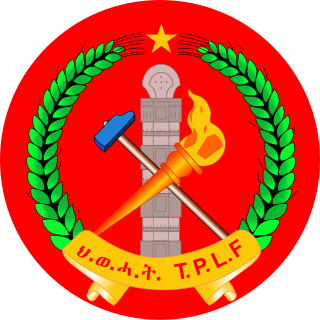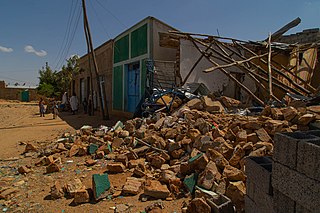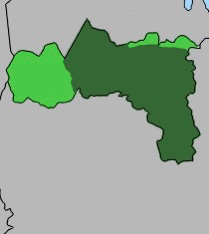
Seyoum Mesfin Gebredingel was an Ethiopian politician and diplomat. He was Ethiopia's Minister of Foreign Affairs from 1991 to 2010 and served as Ethiopia's Ambassador to China from 2011 to 2017.

The Tigray People's Liberation Front, also called the Tigrayan People's Liberation Front, is a left-wing ethnic nationalist, paramilitary group, and the former ruling party of Ethiopia. It was classified as a terrorist organization by the Ethiopian government from May 2021 until its removal from the list in March 2023. In older texts and Amharic publications, it is known as Woyane or Wayane.
Abay "Amha" Tsehaye was an Ethiopian politician and a prominent personality in the Ethiopian political discourse. He was active in the political scene from the early 1960s up to late 2018, initially as one of the founding members of the TPLF, followed by important positions from 1990 to 2018 within the EPRDF, which led the Ethiopian government, after which he retired and moved to live in Axum and Mekelle in Tigray.
Alexander William Lowndes de Waal, a British researcher on African elite politics, is the executive director of the World Peace Foundation at the Fletcher School of Law and Diplomacy at Tufts University. Previously, he was a fellow of the Harvard Humanitarian Initiative at Harvard University, as well as program director at the Social Science Research Council on AIDS in New York City.

The Tigray War was an armed conflict that lasted from 3 November 2020 to 3 November 2022. The war was primarily fought in the Tigray Region of Ethiopia between forces allied to the Ethiopian federal government and Eritrea on one side, and the Tigray People's Liberation Front (TPLF) on the other.
The Transitional Government of Tigray was a caretaker administration that was formally declared by the House of Federation of Ethiopia on 7 November 2020, in the context of a conflict between the Tigray People's Liberation Front (TPLF), in power in the Tigray Regional State and the federal government of Ethiopia. In late November 2020, the administration, headed by Mulu Nega, planned public consultation and participation in choosing new leaders at the regional and zonal level and preservation of woreda and kebele administrations. The Transitional Government left Tigray in late June 2021 during Operation Alula.
This timeline of the Tigray War is part of a chronology of the military engagements of the Tigray War, a civil war that began in the Tigray Region of Ethiopia in early November 2020.
On 3–4 November 2020, forces loyal to the Tigray People's Liberation Front (TPLF) launched attacks on the Ethiopian National Defense Force (ENDF) Northern Command headquarters in Mekelle and bases in Adigrat, Agula, Dansha, and Sero in the Tigray Region, marking the beginning of the Tigray War. The Ethiopian federal government stated that these attacks justified the ENDF's military action against the TPLF, which, at the time the attacks occurred, held control over the Tigray Region. The TPLF described the action as "a pre-emptive strike."

The Axum massacre was a massacre of about 100–800 civilians that took place in Axum during the Tigray War. The main part of the massacre occurred on the afternoon and evening of 28 November 2020, continuing on 29 November, with smaller numbers of extrajudicial killings taking place earlier, starting from 19 November and during the weeks following the 28–29 November weekend. The massacre was attributed to the Eritrean Defence Forces (EDF) by Amnesty International, Associated Press, the Ethiopian Human Rights Commission (EHRC), Human Rights Watch (HRW) and Adigrat University lecturer Getu Mak.

All sides of the Tigray War have been repeatedly accused of committing war crimes since it began in November 2020. In particular, the Ethiopian federal government, the State of Eritrea, the Tigray People's Liberation Front (TPLF) and Amhara regional forces have been the subject of numerous reports of both war crimes and crimes against humanity.

The Tigrayan peace process encompasses the series of proposals, meetings, agreements and actions that aimed to resolve the Tigray War.

Events in Hawzen in the Tigray War included five mass extrajudicial killings that took place in Hawzen in the Tigray Region of Ethiopia during the Tigray War in November and December 2020 and January and February 2021, looting and destruction Hawzen Primary Hospital by the Eritrean Defence Force (EDF), and the establishment of a rape camp in the hospital by the Ethiopian National Defense Forces (ENDF).

The Tigray Defense Forces, colloquially called the Tigray Army is a paramilitary group located in the Tigray region of Ethiopia. It was founded by former generals of the Ethiopian Military in 2020 to combat federal forces enforcing national government mandates in the Tigray region, culminating in 2020 with the outbreak of the Tigray War. The TDF has made use of guerilla tactics and strategies. Human rights groups including Amnesty International and Human Rights Watch have reported that the TDF has committed war crimes against civilians including gang rape and extrajudicial killing during their occupation of both the Afar and Amhara regions. According to the Ethiopian Ministry of Justice, TDF combatants have been found liable for upwards of 540 civilians casualties. as of 28 December 2021.

Tsadkan Gebretensae is an Ethiopian former military officer. He is a Lieutenant general and member of the central command of the Tigray Defense Forces. In 1976 Tsadkan joined Tigray People's Liberation Front, becoming one of its main commanders in the Ethiopian Civil War. Following the war, he became chief of staff of the Ethiopian National Defense Force, rebuilding the force and leading it in the Eritrean-Ethiopian War. After the start of the Tigray War in 2020, he rejoined the Tigray's military leadership. Tsadkan is widely regarded as one of Africa's best military thinkers and strategists.

The United Front of Ethiopian Federalist and Confederalist Forces (UFEFCF) was a coalition of six Ethiopian rebel groups, including the Tigray People's Liberation Front (TPLF) before 2022 and the Oromo Liberation Army (OLA), created in November 2021 during the Tigray War.

The TDF–OLA joint offensive was a rebel offensive in the Tigray War and the OLA insurgency starting in late October 2021 launched by a joint rebel coalition of the Tigray Defense Forces (TDF) and Oromo Liberation Army (OLA) against the Ethiopian National Defense Forces (ENDF) and government. The TDF and OLA took control of several towns south of the Amhara Region in the direction of the Ethiopian capital Addis Ababa in late October and early November. Claims of war crimes included that of the TDF extrajudicially executing 100 youths in Kombolcha, according to deral authorities.
This Timeline of the Tigray War is part of a chronology of the military engagements of the Tigray War, a civil war that began in the Tigray Region of Ethiopia in early November 2020.

Tigrayan nationalism is an ethnic nationalism that advocates the interests of Tigrayan people in Ethiopia. Inspired predominantly by the Tigray People's Liberation Front (TPLF) with its predecessor Tigray Liberation Front (TLF), this type of nationalism holds that Tigrayans are an independent group with unique ancestry, heritage, history and culture outside Ethiopia. As such, they claim Tigray is the source of Ethiopian civilization and utterly a benefactor of state-building without other local ethnic groups. Tigrayan nationalists accuse Amharas of imposing their cultural, economic and political hegemony over Tigrayans.
The 1995 Ethiopian Federal Constitution formalizes an ethnic federalism law aimed at undermining long-standing ethnic imperial rule, reducing ethnic tensions, promoting regional autonomy, and upholding unqualified rights to self-determination and secession in a state with more than 80 different ethnic groups. But the constitution is divisive, both among Ethiopian nationalists who believe it undermines centralized authority and fuels interethnic conflict, and among ethnic federalists who fear that the development of its vague components could lead to authoritarian centralization or even the maintenance of minority ethnic hegemony. Parliamentary elections since 1995 have taken place every five years since enactment. All but one of these have resulted in government by members of the Ethiopian People's Revolutionary Democratic Front (EPRDF) political coalition, under three prime ministers. The EPRDF was under the effective control of the Tigray People's Liberation Front (TPLF), which represents a small ethnic minority. In 2019 the EPRDF, under Abiy, was dissolved and he inaugurated the pan-ethnic Prosperity Party which won the 2021 Ethiopian Election, returning him as prime minister. But both political entities were different kinds of responses to the ongoing tension between constitutional ethnic federalism and the Ethiopian state's authority. Over the same period, and all administrations, a range of major conflicts with ethnic roots have occurred or continued, and the press and availability of information have been controlled. There has also been dramatic economic growth and liberalization, which has itself been attributed to, and used to justify, authoritarian state policy.

The Ethiopia–Tigray peace agreement, commonly called the Pretoria Agreement or the Cessation of Hostilities Agreement (CoHA), is a peace treaty between the government of Ethiopia and the Tigray People's Liberation Front (TPLF) that was signed 2 November 2022, wherein both parties agreed to a "permanent cessation of hostilities" to end the Tigray War. The agreement was made effective the next day on 3 November, marking the two-year anniversary of the war.











